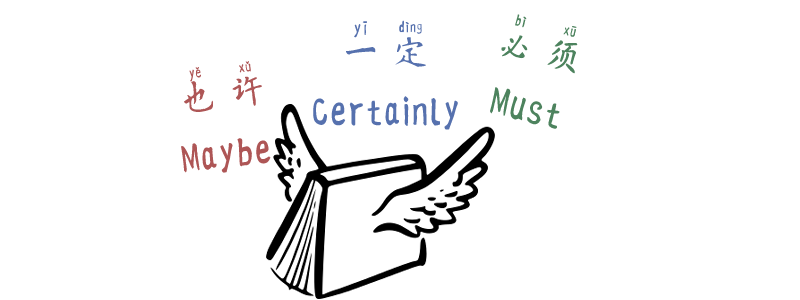Grammar Point:
In Chinese, the translations for “must,” “certainly,” and “maybe” are 必须 bìxū, 一定 yídìng, and 也许 yěxǔ. But they do have some overlap parts.
Structure
All three of these words are adverbs in Chinese, which means they are not placed like in English where you put them before the subject or at the end of the sentence. In Chinese, most of cases, they must be positioned before the verbs and after the subjects.
必須/必须 bìxū
必须 bìxū can be translated as “must” or “have to.” It indicates a strong obligation or requirement. And it emphasizes that something is necessary and must be done.
你必須完成這個報告你必须完成这个报告
You must complete this report.
我必須先去銀行存錢我必须先去银行存钱
I must go to the bank to deposit money first.
政府必須為這件事負責政府必须为这件事负责
The government must take responsibility for this matter.
小強必須死!小强必须死!
Cockroach must die!
FYI
小強 xiǎo qiáng is a common term used to refer to a cockroach in Chinese. The name 小強 xiǎo qiáng literally translates to “Little Strong” or “Little Powerful.” The reason it has become synonymous with cockroaches is due to a popular Hong Kong movie in which the main character caught a cockroach and kept it as a pet, naming it 小強 xiǎo qiáng. Over time, the term 小強 xiǎo qiáng has been widely adopted by Chinese speakers as a colloquial and humorous way to refer to cockroaches.
媽媽不必須做飯妈妈不必须做饭 ❌
Mom doesn’t have to cook.
(The negation of 必須 bìxū is “不需要 bù xūyào,” not “不必須 bú bìxū “)
媽媽不需要做飯妈妈不需要做饭 ✅
Mom doesn’t need to cook.
一定 yídìng
一定 yídìng can be translated as “must,” “necessarily”or “certainly.” It expresses a high degree of certainty or assurance. And it emphasizes that something is definitely going to happen or be true.
我們一定會通過HSK2我们一定会通过HSK2
我一定要在5點前到機場我一定要在5点前到机场
她一定要吃那家麵包店的蛋糕嗎?她一定要吃那家面包店的蛋糕吗?
努力的人不一定會成功努力的人不一定会成功
Hardworking people do not necessarily guarantee success.
你一定不是台灣人,你的中文很奇怪你一定不是台湾人,你的中文很奇怪
You are definitely not Taiwanese; your Chinese is strange.
也許/也许 yěxǔ
也许 yěxǔ can be translated as “maybe” or “perhaps.” It expresses uncertainty or possibility. And it suggests that something may or may not happen or be true. Another alternative choice is 可能 kěnéng.
明天也許會下雨明天也许会下雨
It might rain tomorrow.
我也許不能去參加派對我也许不能去参加派对
I might not be able to attend the party.
你說的也許是對的你说的也许是对的
What you said may be correct.
也許 yěxǔ is the exception that you can place it before the subjects.
也許你說的是對的也许你说的是对的
Perhaps what you said is correct.
也許我們都錯了也许我们都错了
Perhaps we are all wrong.
Practice
TouchHover over the space to see the answers.
✔️ I think she might have misunderstood you.
我覺得她可能誤會你了我觉得她可能误会你了
✔️ You need to explain it to her clearly.
你必須跟她解釋清楚你必须跟她解释清楚
✔️ She must also be waiting for you to call her.
她一定也在等你打電話給她她一定也在等你打电话给她


